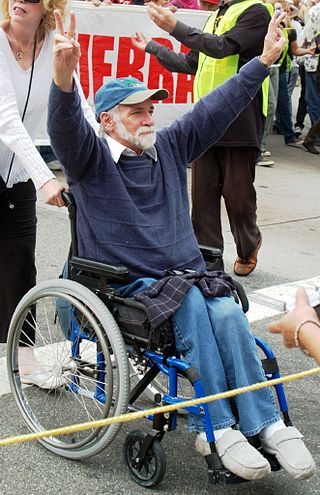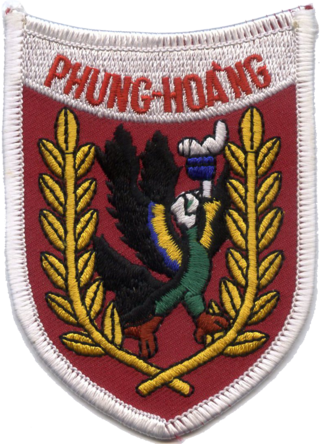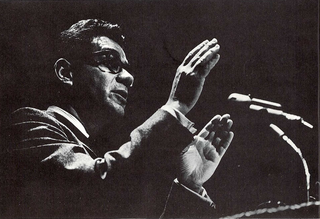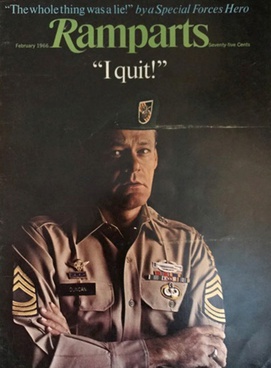This article has an unclear citation style .(March 2020) |
Michael Uhl (born 1944) is a Vietnam veteran, antiwar activist, critic and academic.
This article has an unclear citation style .(March 2020) |
Michael Uhl (born 1944) is a Vietnam veteran, antiwar activist, critic and academic.
Uhl was born in 1944 and grew up in Babylon, Long Island, New York. He graduated with a BS in Theoretical linguistics from the Faculty of Languages and Linguistics, Georgetown University. He holds an interdisciplinary Ph.D. in American Studies and Writing (Creative Non-fiction) from the Union Institute and University. [1]
This section of a biography of a living person does not include any references or sources .(January 2020) |
In the Army, Uhl served in Vietnam during 1968-69 as a first lieutenant, where he led a combat intelligence team with the 11th Infantry Brigade. After Vietnam, Uhl entered a doctoral program in linguistics at New York University, and became immediately involved in the antiwar movement, joining the New York City based Citizens Commission of Inquiry on U.S. War Crimes in Vietnam (CCI) as a full-time organizer. [lower-alpha 1] He helped organize the National Veterans Inquiry and the Winter Soldier Investigation. In 1970, Uhl joined Ed Murphy in exposing the Phoenix Program, testified at the International Enquiry on US War Crimes in Stockholm, Sweden, and in 1971, he was called to testify before a US Congressional subcommittee investigating the CIA's Phoenix Program in Vietnam. He co-authored the first book-length treatment on the health effects of chemical herbicides (Agent Orange) on U.S. veterans of the Vietnam War.
He has authored or edited numerous works within the Antiwar movement, [3] [4] including:
Uhl also authored multiple travel guides, including four for Frommer's Guides. [5]
With Richard Schmiechen, Uhl wrote and co-produced the short documentary film, Nick Mazucco: Biography of an Atomic Vet, on a grant from the Public Broadcasting Corporation.

The Vietnam War was a conflict in Vietnam, Laos, and Cambodia from 1 November 1955 to the fall of Saigon on 30 April 1975. It was the second of the Indochina Wars and a major conflict of the Cold War. While the war was officially fought between North Vietnam and South Vietnam, the north was supported by the Soviet Union, China, and other communist states, while the south was supported by the US and anti-communist allies. This made it a proxy war between the US and Soviet Union. It lasted almost 20 years, with direct US military involvement ending in 1973. The conflict spilled into the Laotian and Cambodian civil wars, which ended with all three countries becoming communist in 1975.

Ronald Lawrence Kovic is an American anti-war activist, author, and United States Marine Corps sergeant who was wounded and paralyzed in the Vietnam War. His 1976 memoir Born on the Fourth of July was made into the film of the same name which starred actor Tom Cruise as Kovic, and was co-written by Kovic and directed by Oliver Stone.

The Phoenix Program was designed and initially coordinated by the United States Central Intelligence Agency (CIA) during the Vietnam War, involving the American, South Vietnamese militaries, and a small amount of Special forces operatives from the Australian Army Training Team Vietnam. In 1970, CIA responsibility was phased out, and the program was put under the authority of the Civil Operations and Revolutionary Development Support (CORDS).
The National Veterans' Inquiry was a national-level inquiry into American war crimes in Vietnam. They were held December 1–3, 1970 in Washington, DC.

Opposition to United States involvement in the Vietnam War began with demonstrations in 1965 against the escalating role of the United States in the Vietnam War. These demonstrations grew into a broad social movement over the ensuing several years. This movement informed and helped shape the vigorous and polarizing debate, primarily in the United States, during the second half of the 1960s and early 1970s on how to end the Vietnam War.

Mark Lane was an American attorney, New York state legislator, civil rights activist, and Vietnam war-crimes investigator. Sometimes referred to as a gadfly, Lane is best known as a leading researcher, author, and conspiracy theorist on the assassination of United States President John F. Kennedy. Lane authored many books, including 10 on the JFK assassination, such as Rush to Judgment,, the 1966 number-one bestselling critique of the Warren Commission and Last Word: My Indictment of the CIA in the Murder of JFK, published in 2011.
A free-fire zone in U.S. military parlance is a fire control measure, used for coordination between adjacent combat units. The definition used in the Vietnam War by U.S. troops may be found in field manual FM 6-20:
The "Winter Soldier Investigation" was a media event sponsored by the Vietnam Veterans Against the War (VVAW) from January 31, 1971, to February 2, 1971. It was intended to publicize war crimes and atrocities by the United States Armed Forces and their allies in the Vietnam War. The VVAW challenged the morality and conduct of the war by showing the direct relationship between military policies and war crimes in Vietnam. The three-day gathering of 109 veterans and 16 civilians took place in Detroit, Michigan. Discharged servicemen from each branch of the armed forces, as well as civilian contractors, medical personnel and academics, all gave testimony about war crimes they had committed or witnessed during the years 1963–1970.

Vietnam Veterans Against the War (VVAW) is an American tax-exempt non-profit organization and corporation founded in 1967 to oppose the United States policy and participation in the Vietnam War. VVAW is a national veterans' organization that campaigns for peace, justice, and the rights of all United States military veterans. It publishes a twice-yearly newsletter, The Veteran; this was earlier published more frequently as 1st Casualty (1971–1972) and then as Winter Soldier (1973–1975).
James Reston Jr. was an American journalist, documentarian and author of political and historical fiction and non-fiction. He wrote about the Vietnam War, the Jonestown Massacre, civil rights, the impeachment of Richard Nixon, and the September 11 attacks.
Thomas Decatur "Tod" Ensign was an American veterans' rights lawyer and director of Citizen Soldier, a non-profit GI and veterans' rights advocacy group based in New York City. Ensign held two law degrees, a Master of Laws (LLM) from NYU and Juris Doctor (J.D.) from Wayne State University, as well as a BA from Michigan State University.
The National Committee for a Citizens Commission of Inquiry on U.S. war crimes in Vietnam was founded in New York by Ralph Schoenman in November 1969 to document American atrocities throughout Indochina. The formation of the organization was prompted by the disclosure of the My Lai Massacre on November 12, 1969, by Seymour Hersh, writing for the New York Times. The group was the first to bring to public attention the testimony of American Vietnam War veterans who had witnessed or participated in atrocities.
Ed Murphy is an American peace and labor activist, the founding and retired Executive Director of the Workforce Development Institute. He was a former military intelligence soldier who exposed the CIA's Phoenix Program in April 1970.

Master Sergeant Donald Walter Duncan was a U.S. Army Special Forces soldier who served during the Vietnam War, helping to establish the guerrilla infiltration force Project DELTA there. Following his return to the United States, Duncan became one of the earliest military opponents of the war and one of the antiwar movement's leading public figures. Duncan is best remembered as the cover image on the February 1966 issue of Ramparts where he announced "I quit", as well as for his 1967 book The New Legions and his testimony to the 1967 Russell Tribunal, both of which detailed American war crimes in Vietnam.
John W. Donaldson (1924–2008) was a brigadier general in the United States Army. He served in World War II, the Korean War and the Vietnam War.

The Concerned Officers Movement (COM) was an organization of mainly junior officers formed within the U.S. military in the early 1970s. Though its principal purpose was opposition to the U.S. involvement in the Vietnam War, it also fought for First Amendment rights within the military. It was initiated in the Washington, D.C., area by commissioned officers who were also Vietnam Veterans, but rapidly expanded throughout all branches and many bases of the U.S. military, ultimately playing an influential role in the opposition to the Vietnam War. At least two of its chapters expanded their ranks to include enlisted personnel (non-officers), in San Diego changing the group's name to Concerned Military, and in Kodiak, Alaska, to Concerned Servicemen's Movement.

The Stop Our Ship (SOS) movement, a component of the overall civilian and GI movements against the Vietnam War, was directed towards and developed on board U.S. Navy ships, particularly aircraft carriers heading to Southeast Asia. It was concentrated on and around major U.S. Naval stations and ships on the West Coast from mid-1970 to the end of the Vietnam War in 1975, and at its height involved tens of thousands of antiwar civilians, military personnel and veterans. It was sparked by the tactical shift of U.S. combat operations in Southeast Asia from the ground to the air. As the ground war stalemated and Army grunts increasingly refused to fight or resisted the war in various other ways, the U.S. “turned increasingly to air bombardment”. By 1972 there were twice as many Seventh Fleet aircraft carriers in the Gulf of Tonkin as previously and the antiwar movement, which was at its height in the U.S. and worldwide, became a significant factor in the Navy. While no ships were actually prevented from returning to war, the campaigns, combined with the broad antiwar and rebellious sentiment of the times, stirred up substantial difficulties for the Navy, including active duty sailors refusing to sail with their ships, circulating petitions and antiwar propaganda on board, disobeying orders, and committing sabotage, as well as persistent civilian antiwar activity in support of dissident sailors. Several ship combat missions were postponed or altered and one ship was delayed by a combination of a civilian blockade and crewmen jumping overboard.

Waging Peace in Vietnam: U.S. Soldiers and Veterans Who Opposed the War is a non-fiction book edited by Ron Carver, David Cortright, and Barbara Doherty. It was published in September 2019 by New Village Press and is distributed by New York University Press. In March 2023 a Vietnamese language edition of the book was launched at the War Remnants Museum in Ho Chi Minh City, Vietnam.

Home Before Morning: The Story of an Army Nurse in Vietnam is a memoir written by American writer Lynda Van Devanter in 1983. The memoir, originally published by Beaufort Books, explores Van Devanter's experience as a nurse during the Vietnam War. It was adapted into a popular TV show, China Beach, which ran from 1988 to 1991.

On April 23, 1971 Vietnam Veterans Against the War staged what was arguably "one of the most dramatic and influential events of the antiwar movement" as hundreds of Vietnam veterans, dressed in combat fatigues and well worn uniforms, stepped up, and angrily, one after another for three straight hours, hurled their military medals, ribbons, discharge papers, and even a cane, onto the steps of the U.S. Capitol. Many of them paused to speak, expressing sentiments ranging from "I pray that time will forgive me and my brothers for what we did" to "I got a purple heart and I hope I get another one fighting these mother-fuckers."